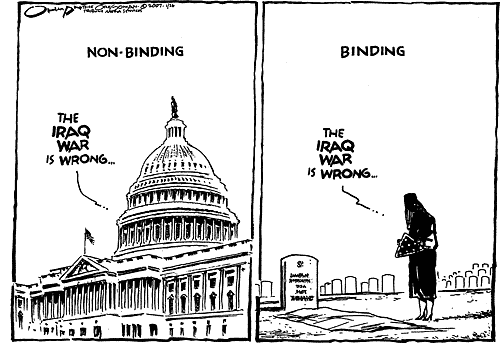Monday, February 19, 2007
AP: 2 Baghdad Car Bombs Kill 56, Injure Scores


Plumes of smoke from the explosion of two car bombs at an outdoor market in Baghdad on Sunday.
2 Baghdad Car Bombs Kill 56, Injure Scores
Filed at 10:12 a.m. ET
BAGHDAD, Iraq (AP) -- Two car bombs exploded in an outdoor market in Baghdad on Sunday, killing at least 56 people and injuring scores in the deadliest attack since U.S. and Iraqi forces began a major security push around the capital last week.
The twin blasts -- which tore through the open-air market in the mostly Shiite district of New Baghdad -- marked the first major response by militants to the sweep launched last week and a sobering reminder of the huge challenges facing any efforts against the well-armed factions.
The death toll was reported by police and ambulance service officials on condition of anonymity because they were not authorized to speak to media. At least 127 people were injured, they reported.
The explosions toppled wooden vendors' stalls and utility poles, and blood pooled in the debris. Victims were carried into hospitals on makeshift stretchers or in the arms of rescuers.
A separate car bomb in the mostly Shiite area of Sadr City killed at least one person and injured 10, police said.
The U.S. military reported the deaths of two American soldiers, one of them in Baghdad who was killed when an insurgent hurled a grenade at his vehicle. The other soldier died when a patrol came under fire north of Baghdad, the statement said. Both died Saturday.
Iraq reopened border crossings with Iran after a three-day closure that coincided with the launch of the security push.
The key Shalamcha border point, about 35 miles east of the southern city of Basra, was cleared of blockades along with others along the long frontier with Iran, said the director of border operations, Brig. Gen. Rahdi Karim al-Makiki. The United States and allies claim Iraqi militants receive aid and supplies from Iran, including parts for lethal roadside bombs targeting U.S. forces. Iran denies any role in trafficking weapons.
The Iranian and Syrian borders were closed as the security operation got under way in Baghdad. A spokesman for the plan, Brig. Gen. Qassim Moussawi was quoted in the Azzaman newspaper that the borders would be reopened gradually but remain under ''intense observations.''
In Tehran, Syrian President Bashar Assad held talks with Iranian leaders, including President Mahmoud Ahamedinejad. Though allies, they are generally on opposing sides of Iraq's sectarian divide: Iran backing the majority Shiites and Syria seen as a key supporter of Sunnis.
But Iran denied that radical Shiite cleric Muqtada al-Sadr has crossed over from Iraq.
''No, he is not in Iran,'' Mohammad Ali Hoseini, spokesman for the ministry, told journalists during a regular press briefing in Iran's first comment on the issue. ''The report is baseless and a kind of psychological warfare against Iran by the U.S. to put more pressure on Iran.''
The chief U.S. military spokesman in Iraq, Maj. Gen. William Caldwell, said Thursday that al-Sadr ''is not in the country'' and that ''all indications are, in fact, that he is in Iran.'' An adviser to Iraq's prime minister also said al-Sadr was in Iran, but denied he fled to escape possible capture during the increased security sweeps.
Al-Sadr's Mahdi Army militia in Iraq is widely believed to receive Iranian money and weapons, but his forces are also cooperating on some levels with Iraq's U.S.-backed government.
In Baghdad, U.S. and Iraqi forces expanded their network of checkpoints and moved search teams into new neighborhoods to seek weapons and suspected militant leaders. But the more difficult goal was convincing nervous residents that the more aggressive policing could be a genuine sign of hope.
Iraqi officials had quickly boasted of the security plan's successes after several days of relative calm. A spokesman for the plan, Brig. Gen. Qassim Moussawi, said Saturday that Baghdad had witnesses an 80 percent drop in violence since it took effect.
In past security drives, militants simply held back while soldiers pushed through and then returned to their campaigns of bombings and attacks. On Thursday, seven civilians were killed in a series of car bombs on the first full day of the security operation.
''The Baghdad security plan is very important to push Iraq ahead,'' said Haider al-Obadi, a parliament member from the Dawa party of Prime Minister Nouri al-Maliki.
On Saturday, Secretary of State Condoleezza Rice told al-Maliki that the security push needs to ''rise above sectarianism'' and tackle both Sunni and Shiite districts in order to be credible, said an Iraqi official who spoke on condition of anonymity because he was not authorized to speak to media.
Sunni officials have complained that the troops are concentrating on Sunni areas and have avoided Shiite strongholds in the city, including the Mahdi Army hotbed of Sadr City.
Rice also urged al-Maliki not to squander the relative calm in the capital since the security operation got under way.
''None of us knows the full story of precisely what the militias are doing,'' Rice said. ''But if there is a diminution in the violence as a result, if they have decided that they are not going to challenge the Baghdad security plan, then the use of that time for good purposes could make the situation much more stable.''